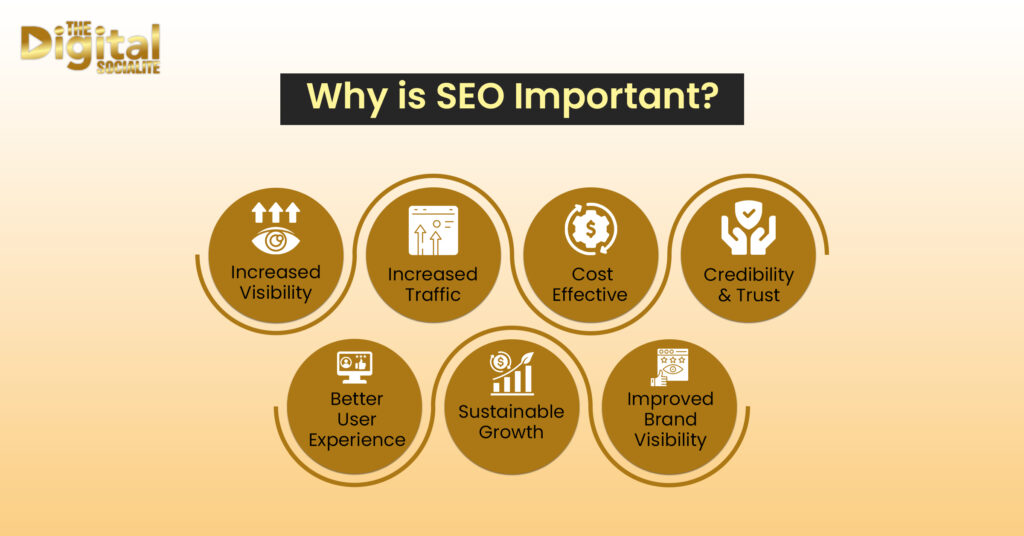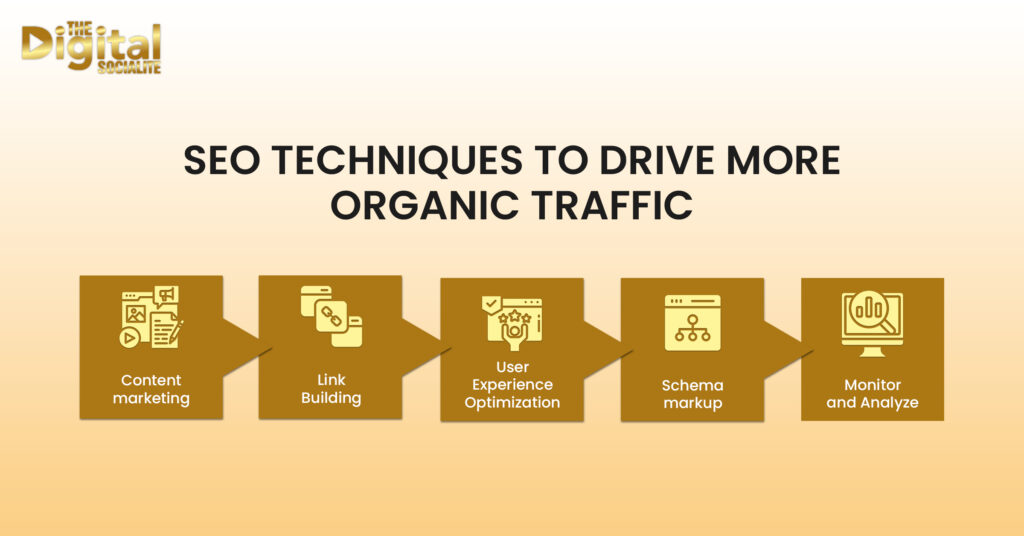Modern online presence necessitates more than simply having an online presence since websites need discoverability among billions of digital pages. Actual success depends on your ability to make your page discoverable through the vast number of pages that exist online. Search Engine Optimization provides a vital solution for improving website ranking. This guide provides an explanation of what SEO means along with explanations of its importance followed by easy-to-implement ranking enhancement steps for websites.
What is SEO and Why is it Important for Websites?
Search Engine Optimization represents what every webpage requires to succeed in online space. Search Engine Optimization (SEO) serves as the foundation for website visibility on search engine results pages (SERPs) for product or service searches because it enhances website performance to enhance search visibility. A website that appears higher in search engine result pages receives more website visitors. SEO aims to garner as much organic or unpaid traffic as possible through search engines like Google and Bing
A business located in a busy city center becomes easily missed due to its hidden position in a side street. You gain visibility through SEO by establishing clear navigation with visible advertisement signs that guide customers directly to your business. Search engine optimization allows your website content to deliver effective answers to questions and present products to searchers effectively so when SEO is absent your website loses these vital functions.
Related: Comprehensive Guide to SEO: On-Page, Off-Page, Technical, and Local SEO Strategies
Why is SEO important?

- Increased Visibility & Traffic: Site rankings determine how often visitors view your page thus producing higher traffic numbers.
- Cost-Effective Marketing: Your site attracts unlimited free visitors through ranking for essential search terms each month.
- Credibility and Trust: The credibility of your website improves when it occupies a high position in search engine results. People tend to view superior rankings as coming from trustworthy organizations.
- Better User Experience: User satisfaction improves because SEO delivers appropriate content as well as enhances user experience.
- Sustainable Growth: Through its ability to advance your brand’s search visibility SEO provides sustainable business growth.
- Improved Brand Visibility: The higher your ranking in the search results increases both your brand’s visibility to the online audience.
How to Improve SEO Rankings for Beginners
Even if improving your SEO ranking seems daunting, there exist several areas where you can begin to make an impact for potential:

- Keyword Research: A crucial step in an effective SEO. This consists of describing the words and phrases that your users, potential customers, or perhaps competitors use to find information related to your business.
- Tools include Google Keyword Planner, Semrush, or Ahrefs for you to find relevant keywords.
- Search for terms that receive a fair amount of search traffic yet are easy enough to compete with.
- Long-tail keywords, consisting of longer and more specific phrases, have less competition.
- On-Page Optimization: This is the optimization of certain aspects within your website to foster ranking growth.
- Title Tags: Enticing title tags (displayed in search results)-incorporating the target keyword.
- Meta Descriptions: Succinct and enticing meta descriptions (the short summary just below the title tag) are included to intrigue users to click.
- Header Tags (H1-H6): Incorporating header tags to emphasize structured content and accentuate the important keywords.
- Content Optimization: To improve content that is of high quality, informative and resides well with your target keywords.
- Image Optimization: Optimize images through the use of relevant keywords in descriptive filenames and alt tags.
- Off-Page Optimization: This means building the authority and reputation of websites from activities away from your website.
- Link Building: Acquiring backlinks from credible and relevant sites. This signals to search engines that your website is set with a trustworthy and important value.
- Social Media: Share your content on social media to gain increased visibility.
- Online reputation management: Keeping track of your online reputation remains essential while you handle all negative feedback and reviews.
- Technical SEO: Technical SEO enables fast crawling and indexing of search engine understandability when it comes to website elements.
- Website speed: User experience gets harmed when pages need excessive time to load since it creates negative impacts on website ranking.
- Mobile friendliness: Your site requires designing with responsive structure alongside mobile compatibility features.
- Sitemap: To enable search engine discovery of all web pages for indexing you should have sitemap implemented.
- Robots.txt: Place a robots.txt file to instruct search engines about page crawling permissions and excluded pages from search activities.
- HTTPS: Users will remain safe from data theft because HTTPS (secure HTTP) functions as an essential requirement for your site.
SEO Techniques to Drive More Organic Traffic to Your Website
An advanced collection of SEO techniques exists for developing organic traffic.

- Content marketing: Useful content that remains focused and constantly relevant drives SEO success in both conceptual and practical aspects.
- Blog Posts: Publish regular information and engaging posts on topics relevant to your industry.
- Ebooks/White Papers: Write extensive guides or reports that help you attract leads and establish your expertise.
- Infographics: Use attractive infographics to represent data and information
- Videos: Videos serve three purposes which include education, entertainment and demonstration of your products or services.
- Link Building: Link Building Strategies function as a core practice to improve website link profiles because they enhance both ranking authority and overall position.
- Guest Blogging: Guest Bloggers should submit content pieces to other related websites where they include links that direct users to their own site.
- Broken Link Building: You should look for dead web pages across different sites afterward and propose your content to replace them.
- Resource Page Link Building: You should develop a resourceful page for your website and then approach other platforms to advertise this page.
- User Experience (UX) Optimization: Google positions sites at the top which deliver top-quality user interaction.
- Website Navigation: The website infrastructure requires easy navigation which permits users to discover content without difficulty.
- Mobile-Friendliness: A website needs to be mobile-friendly since we already confirmed its importance.
- Page Speed: The optimization of website loading speed will decrease bounce rates along with improving user engagement.
- Accessibility: Your website should be accessible to all users having disabilities through the use of accessibility guidelines.
- Schema markup: Schema markup represents a beneficial addition to search engine understanding that provides information about your content. Your search results would improve by adding better reports along with higher click-through rates according to this strategy.
- Monitor and Analyze: You should use Google Analytics along with Google Search Console for continuous website performance observation. Use your data analysis to find increased points for improvement so you can track your progress.
How to Optimize Your Website for Local SEO
Implement local SEO optimization to attract neighborhood customers when operating a local business establishment.

These are some of the ways you can do things for the optimization of your site for local search:
1. Claim and optimize your Google Business Profile.
- Keep your name, address, and phone number (NAP) identical all over the internet for effective local search results.
- Upload good quality photos and videos.
- Encourage customers to leave reviews.
- Timely and professionally respond to reviews.
2. Local Citations: The generation of local citations requires businesses to enlist themselves in platforms like Yelp and Yellow Pages as well as specialized industry business directories.
3. Local keyword optimization: Include local keywords in your website content, title tags, and meta description. For instance, it will not be appropriate to say “plumber” without specification; rather, one should say “plumber in Ahmedabad.”
4. Location Pages: Create different location pages for each of your business locations.
5. Mobile Optimization: Ensure that your website is mobile-friendly because many local searches are happening on mobile devices.
6. Local Link Building: Establish backlinks from other local businesses, organizations, and community websites.
Conclusion
SEO takes its time; it is a continuous process requiring patience, consistency, and strategic execution. Following the methods listed above will entail an elevation in rankings, organic traffic, and a setting up of your local business as the strongest competitor ever.
So whether you’re optimizing for your global audience or for local customers, SEO will be the cheapest way to grow online exposure. Start optimizing your website now, and see your organic traffic jump!





